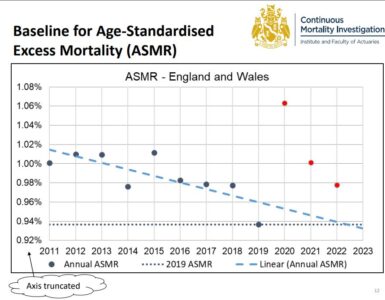The Longevity Science Panel has published The COVID-19 Report, a comprehensive review of COVID-19 effects and responses up to October 2021, bearing in mind that the pandemic is still evolving. The report is intended as a resource for professional users of longevity data including actuaries, risk managers, public health professionals, epidemiologists and researchers. It asks “what do we know?”, “what have we learned?” and “what are the uncertainties?” over a range of issues that could potentially drive the pandemic and longevity going forward. A summary is also available.

Some key learning points and future challenges from the report:
- The pandemic has cost an estimated 155,000 lives in the UK and more than 4.5m lives globally, and while its impact has been profound, the data suggests that approximately 76% of total COVID deaths were in patients in the top 5% for highest predicted risk. These risk factors are varied, including everything from heart disease to obesity, but by far the most substantial is age. The potential contribution of deaths related to COVID-19 in the next few years remains unknown, requiring continued monitoring.
- The emergence of variants of the SARS-CoV-2, such as Alpha and Delta, have led to rapid spreads in parts of the world, notably in India, the UK and US. The potential emergence of faster-spreading, more fatal or vaccine-evading variants is a risk going forward. However, effective vaccination programmes could also mean that COVID-19 becomes less harmful and more like the ‘common cold’.
- At least 20 vaccines have been approved globally against the SARS-CoV-2, with more in the pipeline. In general, they markedly reduce hospitalisation and death rates, but may not fully prevent future infection and transmission. This ‘leakiness’ when combined with the risk of waning immunity and massive international inequalities in vaccine availability and rollout could lead to continued circulation of the virus globally.
- The NHS, though under pressure, has been adept, innovative and resilient throughout the pandemic. New technologies, redeployment of staff and increased inter-departmental collaboration have increased capacity to deal with the pandemic. Lessons learned would improve future care deliveries. However, there is a backlog in diagnosis and treatment in the NHS for other conditions which will take many years to catch up. It may impact death rates as late diagnosis of major killers like cancer and heart disease lead to earlier death.
- The gap in life expectancy between people in different socio-economic circumstances had been wide even before the pandemic. The more deprived have suffered higher rates of infection, hospitalisation and mortality during the pandemic. An endemic COVID-19 scenario might perpetuate these disadvantages, widening the life expectancy gap.
- Improved hygiene, work from home and mask-wearing suppressed influenza infection in the UK and globally in 2020. Success in managing influenza could contribute to more stable rise in longevity trends. However, there is a risk of ‘rebound’ of influenza cases due to reduced immunity from a lack of exposure to the virus and increased social interactions in the population.
- Mortality improvements in many higher income countries had slowed in the decade before the pandemic. The aftershock of the pandemic on health care system, society and economy may continue to suppress mortality improvements in the near future.
- The pandemic has spurred scientific innovation and collaboration from immunology and vaccine science through new approaches to collection and processing of health data and organisation of health care. These benefits could be invaluable in advancing future health-promoting initiatives, technologies and know-how.
Link to full report:
https://covidactuaries.org/wp-content/uploads/attachments/lsp_covid_6_october_2021_publish.pdf
Link to summary:
https://covidactuaries.org/wp-content/uploads/attachments/lsp_on_covid-19.pdf














